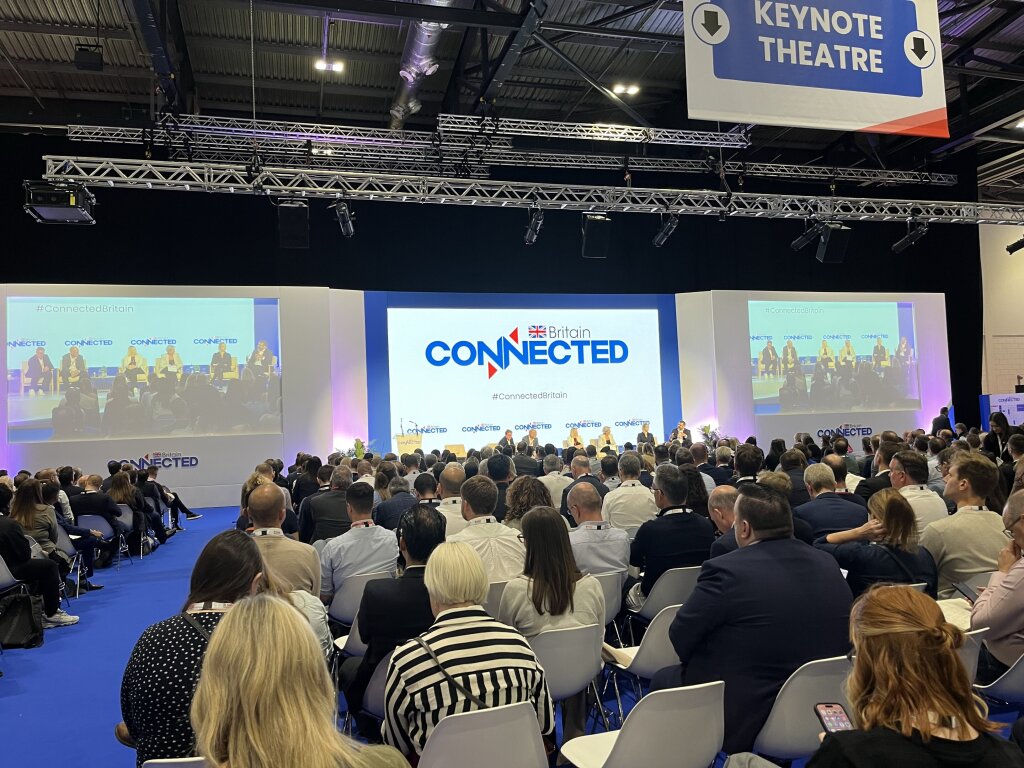26 September 2024
Written by Susanna Kwok, Enterprise Partnerships Manager
Your small business has a broadband line in place, and it connects to your laptop and mobile phone. You don’t need to do more than that, right?
Wrong! Connectivity changes affect all of us. On 30th October 2012, 4G was introduced to us. Before then, we were enjoying the dulcet tones of dial-up and 2G and 3G which left us with a severe case of buffer face. Since then, we’ve been enjoying the spoils of streaming our favourite TV shows and movies, speaking to companies around the world and storing our files in the cloud.
The Connected Britain event was focused on fixed connectivity (fibre and copper broadband including products and services to support it). Businesses continue to use fixed broadband lines as the main connectivity option or a backup for mobile connectivity (3G, 4G and 5G) or integrate a blend of both. With us all relying so heavily on data, there must be continued investment and development in our fixed infrastructure in the UK.
Let’s start with Project Gigabit
The Government recognises how important the UK fixed infrastructure is and that’s why they’ve launched Project Gigabit, a £5 billion programme “to enable hard-to-reach communities to access lightning-fast gigabit-capable broadband”. Whether your business is in the heart of a city or in a fully rural area, you should be able to access reliable and fast broadband and there is a concerted effort being made to achieve this.
We’re always hungry...for more data
Think about how much you do with your devices now that you didn’t ten years ago. Our insatiable appetite for data continues, so network providers and manufacturers continue to develop our infrastructure.
The progress is evident when comparing today's devices to those from the past. Manufacturers now prioritise longer product lifespans, sustainability, and future-proofing in their designs.
What does this actually mean for your business, I hear you ask. Well, when considering connectivity for your small business, you will need to consider your monthly and upfront costs. Having fewer devices that last longer along with a competitive broadband contract, potentially with telephony services included, will inevitably mean lower costs overall.
Competitive contracts you say? Where can I find them?
Long gone are the days of a handful of network providers to choose from. You have more choices now, whether through networks directly or companies who resell broadband lines and services. Manufacturers are dipping their toes in the ISP (Internet Service Provider) market and “disruptor” companies are there to offer options too.
Providers can offer you a variety of mobile and broadband packages with telephony and additional services built in. You can have a unified bundle or split it but ultimately, more competition in the market means competitive pricing and more bargaining power for you.
It’s not all about price though
When considering what network connectivity and telephony you need for your business, it isn’t just a case of thinking about cost.
There are questions you need to ask before exploring your options. Here’s a few to scratch the surface:
Will you be using it on your own or will you have employees sharing it?
If you are the only person requiring connectivity, you may be able to start with a mobile phone and a sufficient data bundle but if you have colleagues needing it too, you will need to consider a data option with more capacity
Will you, and/or your colleagues, be making calls over the Internet? Will this be done over a collaboration tool such as Teams, Zoom or Webex?
This will mean additional costs and require fixed broadband which is reliable and has the capacity for heavy use due to video calls and collaboration
Do you store files in the cloud?
Cloud storage and security costs may need to be considered if this is the case
How big are your premises?
If the premises are large, additional data boosters or a router with a wider range may be needed which would mean more cost
Will you be expanding in the future?
Contracts typically are for 12-24 months with longer contracts providing better commercials for you. However, if you foresee change in your future, it is worth asking about flexibility. This may also apply if you have to downsize
You need to consider a variety of aspects such as data speeds, device capabilities, cloud storage, security, installation costs and contract length as well as costs. Your contract needs to accommodate your business needs, not just for now but for the future.
As a small business owner this can be incredibly daunting so take it in small bitesize chunks. Start by answering these questions and exploring your main prioritises. For solo entrepreneurs, starting with a mobile router could be a great option, buying you some time to consider fibre broadband options. You can then decide what telephony options can be added, e.g. Mobile phones and/or a solution such as Zoom or Teams. Rome wasn’t built in a day and your connectivity package doesn’t need to be either.
So what does Connected Britain mean to me?
Whether you're a business owner or are considering becoming one, you can feel confident knowing that many organisations worldwide, along with the UK government, are working to build a more reliable network with faster broadband speeds available across the UK. Investment is being made and resources are being deployed to implement the changes needed but this will take time.
The PSTN (Public Switched Telephone Network) ripout in 2027, a planned project where the old legacy phone lines will be replaced with cloud telephony, is paving the way for change through an emphasis on the need for your broadband network to be ready for it.
Better infrastructure and technology will provide your business with better connectivity. This, accompanied by more options and competitive pricing means that it’s great from a customer perspective.
So, whether you’re working on yet another spreadsheet in the heart of our nation’s capital or trying to video call while parked in the Peak District, your business will be able to benefit from improved communications. And who knows, by the time the next Connected Britain event comes around, we might be even further ahead!
Related
Action Guide: How small businesses can boost productivity with smart choices
Boosting small business productivity: the role of financial activity
Stay in the know
Subscribe to our monthly Insights newsletter to hear about our upcoming research, or browse the archive.


